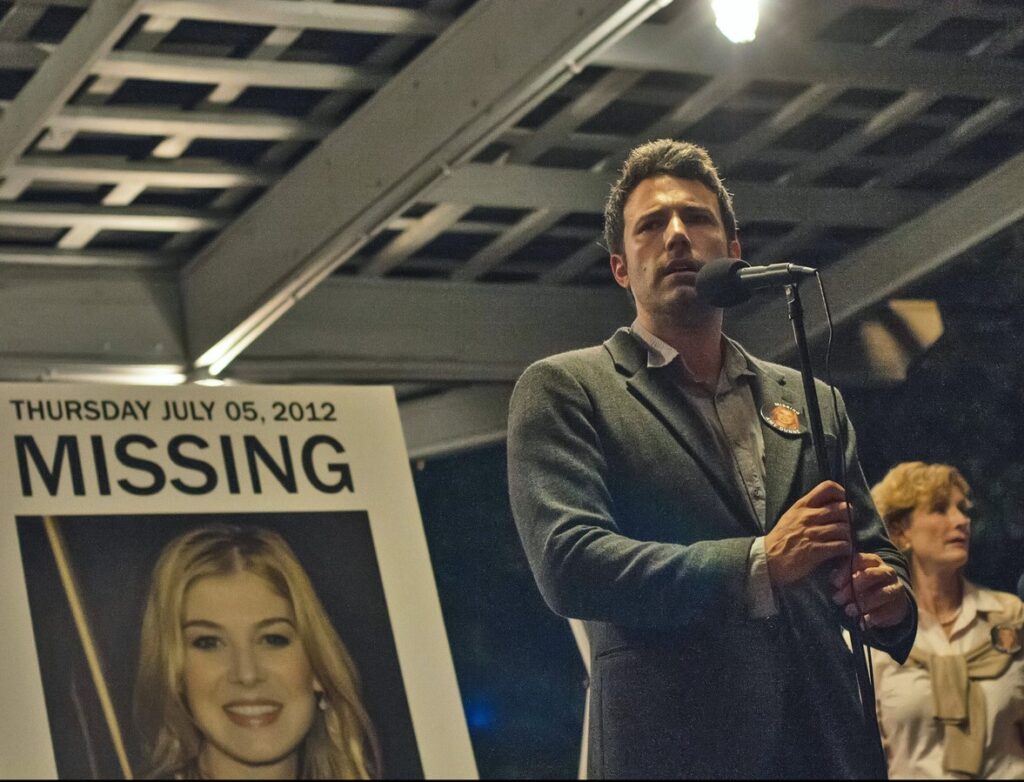When I first read Gone Girl it was on the sandy shores of St Lucia. I’d completed the pre-holiday trip to Waterstones and chosen Gone Girl based on, honestly, the best seller sticker on the front. The short blurb on the back drew me in with the promise of mystery and the book looked to be a real page turner – perfect entertainment for topping up your tan with a cocktail in hand.
*Spoiler alert* Gone Girl tells the story of Nick and Amy who are a seemingly perfect couple. But when Amy goes missing, Nick becomes the main suspect. The first major plot twist reveals that Amy has orchestrated her entire disappearance just to frame her husband for her murder.

I was hooked. Just like the rest of the nation it seemed. I was eager to tell my boyfriend and family about the story, but a film release had just been announced so I waited for the book to be realised on the big screen.
When the film was released in 2014, I made sure to see it at the cinema and bought it on DVD (I know, old school) as soon as it was available. My parents’ loved the twists and turns of the plot. My boyfriend found it enjoyable and enjoyed the brilliant musical score. He looked at me worryingly through the last third of the film but I brushed it off.
I re-watched Gone Girl last month. Since then I’ve really struggled to come to terms with why I was so obsessed with something so damaging and so glamourising of abuse.
Over the course of the film, Amy is revealed to have staged multiple sexual assaults. Her accused are portrayed as victims, unwittingly caught in her web. I can only think that I saw in Amy a woman who took control of her own life and magnificently managed everyone’s opinion of her. I think 21 year old me yearned for this. I wanted my sexual abuse to not have actually happened. I so wanted to be in control.
This was probably the first piece of mainstream media I had seen that broached the topic of sexual abuse. And unfortunately, representations of survivors in popular TV and film are still few and far between. At the time it felt freeing that maybe it was finally a topic people were going to talk about. Maybe I could finally come out of the shadows.
But Gone Girl does not represent a truthful experience. It exists only in a world where it’sis it incredibly easy to make false allegations about sexual abuse and domestic violence. And it’s all believed, because she wrote it in her diary. Let me tell you, from personal experience, diary entries count for nothing.
Gillian Flynn decides to portray Nick as the hapless husband who the audience are persuaded to feel sorry for. This is amplified in the movie and the audience are carried through 2.5 hours fully on Nick’s side. It is such a shame that a rare portrayal of the accusation process depicts the accused as the victim and feeds into the belief that false allegations are prevalent.
In the UK the Crown Prosecution Service produced a report looking at a 17-month period over 2011 and 2012, during which there were 5,651 rape prosecutions. That doesn’t factor the huge numbers that will not have seen a prosecution – mine included. In the same period, only 35 women were prosecuted for making false allegations of rape. The standout finding was that deliberate false allegations of rape or domestic violence are “extremely rare”.
People will argue that it’s just a book/movie, that it’s fiction and people know that. But, sometimes fiction has real world consequences. In America in July 2019 a defence lawyer, used the ‘Gone Girl’ narrative to explain the very real disappearance of Jennifer Dulos.
What upsets me most is all this should have been clear at the time. Why did I, as a survivor, not see any of this? Audiences will accept false norms when it’s in such an entertaining package. Without other mainstream representations of sexual abuse, of being a survivor, or what the accusation process is really like, I never questioned it.
